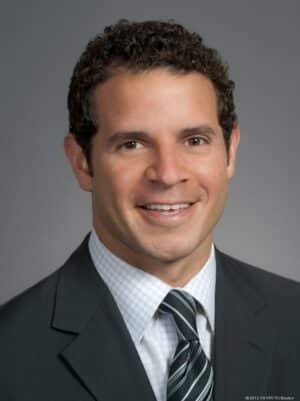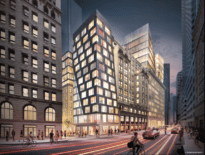Carlos Febres-Mazzei
Chairman, Urban Land Institute Boston/New England
Age: 43
Industry experience: 23 years
Mentorship matters more than ever in the midst of a pandemic. Carlos Febres-Mazzei began returning this month to the Boston offices of Quaker Lane Capital, the real estate investment and development firm he founded in 2019, to show the ropes to a recent college graduate who recently joined the firm as an analyst, providing the sort of in-person guidance that can’t be replicated in a Zoom meeting. The summer of 2020 marks another transition for Fabres-Mazzei as he took over July 1 as chairman of Urban Land Institute Boston/New England chapter. A native of Venezuela who emigrated to the U.S. with his family when he was 4, Fabres-Mazzei is overseeing the group’s initiatives including equity and inclusion strategies such as mentorship and internship programs for minority students.
Q: What are ULI Boston/New England’s top initiatives for 2020?
A: Even before the events of the last 60 days, I had plans to make diversity, equity and inclusion our top priority as a district council. That’s a national emphasis as well. Certainly we’re looking to increase our membership, not just in the Boston metro but the other New England markets from Hartford to Portland, Maine and Burlington, Vermont.
For about two years, we’ve adopted a program from another district council, Pathways to Inclusion, that is specifically for people of color in the commercial real estate industry. They receive a year’s worth of dues for membership, and they receive funds to attend our fall meeting. We also provide mentorship and networking connections to professionals within commercial real estate, some of the highest–profile executives in the city, so these people of color are provided direct access to grow their careers and their businesses.
We’re also a member of the CREST [Commercial Real Estate Success Training]. Kirk Sykes is a senior member of our advisory board and strongly advocated for us to be part of the CREST internship program. In addition, we have a women’s leadership initiative, which allowed us to grow our female membership over the last six or seven years by 25 percent. Lisa Nickerson of Nickerson Public Relations is the co-chair for Boston.
Beyond that, we’re continuing to focus on education for minority students, and what we call technical assistance panels. That allows us to access communities seeking economic development initiatives. We compile a team of senior real estate professionals and do a one- to three-day charette in these communities for some kind of economic land use project, such as a master plan for a downtown district.
Q: Do you see the “Massport model” of requiring diversity in development teams for public property dispositions spreading to other city and state agencies?
A: My company is a certified minority business enterprise, so we closely track those RFPs and see what the agencies are issuing. Massport in the Seaport are the highest–profile parcels, but you’re going to see more opportunities going forward. They’re becoming more specific in what they’re looking for from developers. They’re looking for more diversity in terms of the makeup of the project team, more women-led businesses, and that goes to some of the private RFPs as well. Tom Glynn left Massport to lead Harvard Allston Land Co. and he brought some of that playbook with him.
Q: Why was 2019 the right time to leave brokerage Eastdil Secured and found your new firm, Quaker Lane Capital?
A: I moved to the Boston area in 2004 to attend Babson College for their full-time MBA program. Babson is regarded as the number one business entrepreneurship program in the world, and you walk out the door thinking you’d be a failure if you didn’t start your own company. Entrepreneurship has been in my blood from the day I graduated and it was just a question of when was the right time in the market and having built the network and relationships. And obviously having the capital to do it. Having spent most of my career raising capital for real estate investors, I had the benefit of getting a real comprehensive education on best practices and how to manage risk.
Q: What is Quaker Lane’s criteria for acquisitions?
A: We acquired two assets within 12 months and we’ve been fortunate in getting lenders and investors on board. We’re active in Boston and my hometown, which is Philadelphia, where we see some compelling opportunities. We’re largely spending our time in submarkets that are on the emerging side and a little bit overlooked and undervalued. We’re agnostic on the product type, but we’re very specific on the characteristics of geography. In every deal, we’re looking at some element of social impact: through job creation or entrepreneurship or making investments in a neighborhood that hasn’t benefited from significant institutional investment in the recent past.
Q; How has COVID-19 changed the outlook for various property types and access to equity and debt sources?
A: When you’re talking about Boston, we have the unique advantage of being one of the most fundamentally strong markets in the country. There’s a lot of investor depth here. There are some markets that have increased in value in the last 60 to 90 days including life science and logistics, and outside of that, you’ve seen a little disruption in the luxury multifamily and high-density office space with sublease space coming to market. Compared to the global financial crisis, we have more than two times the amount of dry powder for investment than we did 10 or 12 years ago. The potential decline in value won’t be as significant if the fundamentals hold up, but there are a lot of questions and the thing nobody is talking about is we could be seeing a new administration in the White House and a transition of a majority in [Congress], which usually equates to downward adjustments in value regardless of the asset class.
Q: What are the plans for the site that Quaker Lane Capital acquired at Dartmouth and Pleasant streets in Malden?
A: We’re not exclusive to Opportunity Zones, but we like them because of the economic development impact potential. Everything else we have under agreement or under contract, we’re not at liberty to discuss, but between Boston and Philadelphia it’s upwards of $50 million that could become $200 million in value when scaled. We are very active in many of the communities including Malden, Medford, Chelsea, Everett, Somerville, Allston, Watertown and we’d love to be in Dorchester and Roxbury as well. We’re going through a public process to create some additional density on the excess land we own in Malden and we’re also starting construction on a significant renovation of 21 Pleasant St. that will be a tech-centric creative office. We’ll deliver that space in the fall. And we’ve engaged a premier architect to design a mixed-use development.
Febres-Mazzei’s Five Favorite Podcasts in 2020:
- The Real Market with Chris Rising
- Revisionist History by Malcolm Gladwell
- The Sherman Show by DoubleLine Capital
- The Grant Williams Podcast
- The Fried Egg Podcast






